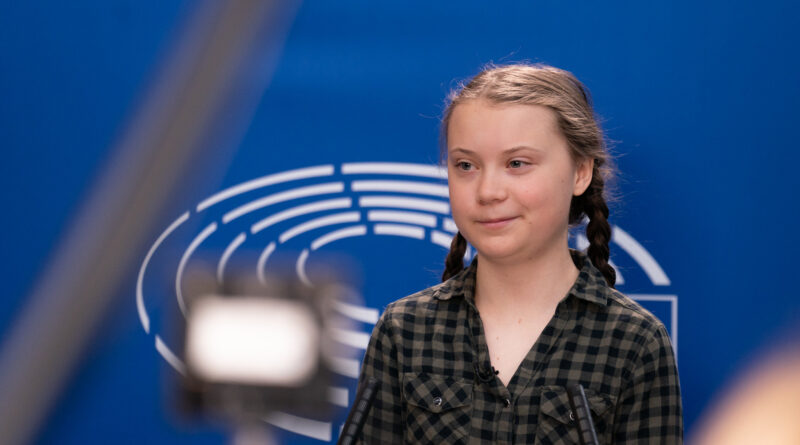The Greta deception
The world’s eyes have been turned to young Greta Thunberg in recent times, as the environmentally conscious 16-year-old Swedish girl has brought urgency to the general public and world leaders about climate change, saying: “We don’t have time”.
However, the stark warning is more than just a slogan, it is the name of an eerie startup that seeks to create an ecotechtopia through the regulation of correct behavior under the guise of saving the planet.
A tweet featuring a photo of a Swedish girl sitting on the side of a street striking against climate change which did the rounds in August of 2018. The girl was Greta and the picture was uploaded by tech company We Don’t Have Time, founded by its CEO Ingmar Rentzhog.
Rentzhog, who claims to have been “the first to pay attention to” the climate activist Greta Thunberg, used her name to bring in almost 10 million Swedish Krona (around 1.1 million US dollars) for a new share issue, according to an investigation by the Svenska Dagbladet newspaper.
The Swedish entrepreneur is the founder of Laika (a prominent Swedish communications consultancy firm providing services to the finance industry, recently acquired by FundByMe), appointed chair of the think tank Global Utmaning on May 24, 2018, and serves on the board of FundedByMe.
He is a member of Al Gore’s Climate Reality Organization Leaders, where he is part of the European Climate Policy Task Force. He received his training in March 2017 by former US vice-president Al Gore in Denver, USA, and again in June 2018, in Berlin. Founded in 2006, Al Gore’s Climate Reality Project is a partner of We Don’t Have Time.
We Don’t Have Time is mainly active in three markets: social media, digital advertising and carbon offsets. The latter is the one that really peaks curiosity.
In the US alone, the estimated market for carbon offsetting amounts to over $82 billion, of which voluntary carbon offset represents $191 million. The market is expected to increase in the future, in 2019 estimated 15% of all greenhouse gas emissions to be associated with any kind of cost for offsetting.
As the company is a niche organization, social networks are able to provide services tailored to platform users. The startup has identified such an opportunity by offering its users the ability to purchase carbon offsets through the platform’s own certification. This option applies to both the individual user of the platform or as a whole organization on the platform.
We Don’t Have Time identifies itself as a movement and tech startup that is currently developing “the world’s largest social network for climate action”
“Through our platform, millions of members will unite to put pressure on leaders, politicians and corporations to act for the climate.” The start-up’s goal to rapidly achieve 100 million users has thus far attracted 435 investors (74.52% of the company’s shares) via the web platform FundedByMe.
“We want to build a platform with modern technology. This is not free; a lot of money is needed. We have so far received just over SEK 20 million from 500 investors through two new issues, of which 10 million was from the last one in December.
“The importance for us is that we can solve the climate crisis. In order for it to succeed, we must have financial resources. Then we cannot just depend on donations. I see nothing wrong with this,” Rentzhog said.
Global Utmaning, the think tank which Rentzhog is chairman of, recently announced a partnership with Global Shapers – an initiative of the World Economic Forum that brings together young leaders worldwide in Switzerland: “Over 3,000 global leaders will come together under the theme Globalization 4.0: Shaping a Global Architecture in the Age of the Fourth Industrial Revolution.”
The Fourth Industrial Revolution is a green, tech-oriented utopia where all industries will have to abide by standards and materials controlled and owned by the same ruling elite. And with startups like We Don’t Have Time able to profit from policing good behaviour, it is a frighteningly slippery slope towards even more centralization of wealth and resources.
“Decision makers – politicians, companies, organizations, states – get a climate rating based on their ability to live up to the users’ initiative. Knowledge and opinion gather in one place and users put pressure on decision makers to drive a faster change,” We Don’t Have Time says.
Who will be the arbitrators of what is correct or improper behaviour? The same tech and media stronghold, with direct links to deep state operatives who control the capitalist economic system and dominate industries which have led to the ecological crises we find ourselves in.
Furthermore, this eco-rating system will be applicable to individuals as well as companies, with frightening similarities to the Chinese social credit score system only the western version will be determined by how ‘eco-positive’ citizens are, and will be the gateway towards the individual’s standing in society based on their opinions.
It is eerily similar to the dystopic Netflix series Black Mirror: The episode “Nosedive” posits a shallow and hypocritical populace in which “social platforms, self-curation and validation-seeking” have become the underpinning of a future society which shares parallels to the concept behind We Don’t Have Time. The difference being instead of rating people exclusively, we will be rating brands, products, corporations and everything else climate related.
What is going on?
“This is the launch of a global campaign to usher in a required consensus for the Paris Agreement, the New Green Deal and all climate related policies and legislation, written by the power elite – for the power elite. This is necessary in order to unlock the trillions of dollars in funding by way of massive public demand,” Cory Morningstar wrote on The Art of Annihilation.
This is a way to try to resuscitate a dying capitalist economy as it would free up $90 trillion in new infrastructure. The likes of Greta Thunberg are stooges in the attempt to gather public support for massive spending on a supposedly ‘green’ economy. In reality, the same system will carry on doing the same things that causes actual environmental damage, like war, in order to keep the money coming in.
This was a simplified introduction to the suspicious nature of Greta Thunberg’s rise to prominence and the implications of an ‘ecotechtopia’ that has far more sinister intentions than saving the planet. The article was based on the excellent breakdown of the ‘We Don’t Have Time’ deception, written by Cory Morningstar which you can find all six parts here. A well worthwhile investigative report.






